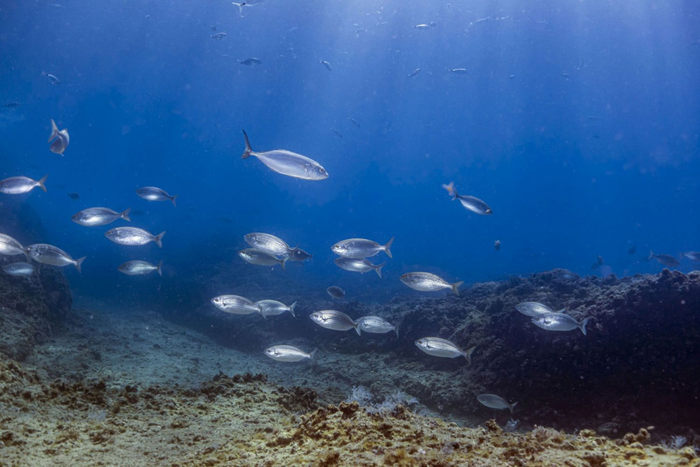The study shows that there are species of marine animals such as fish, crustaceans and mollusks (for example squid) that change their habitats and deepen an average of 55 meters across the climatic gradient of the Mediterranean (spanning a range of 60 C).

Credit: Shahar Chaikin
The study shows that there are species of marine animals such as fish, crustaceans and mollusks (for example squid) that change their habitats and deepen an average of 55 meters across the climatic gradient of the Mediterranean (spanning a range of 60 C).
A new Tel Aviv University study has found that due to the temperature difference across the Mediterranean Sea, species of marine animals such as fish, crustaceans and mollusks (such as squid) are changing their habitats to live tens of meters deeper in cooler waters.
The groundbreaking study was led by PhD student Shahar Chaikin under the supervision of Prof. Jonathan Belmaker, and along with researchers Shahar Dubiner, all from the School of Zoology in the George S. Wise Faculty of Life Sciences and the Steinhardt Museum of Natural History at Tel Aviv University. The results of the study were published in the journal Global Ecology and Biogeography, and have far-reaching implications for both fishing and future marine nature reserves.
The researchers explain that while in recent decades the entire planet has been warming, this process has been particularly marked in the Mediterranean Sea. The average water temperature in the Mediterranean rises by one degree every thirty years, and the rate is only accelerating. One of the urgent questions that must be asked is how, if at all, the various species living in the Mediterranean will adapt to this sudden warming. In recent years, evidence has accumulated that some species have deepened their habitats in order to adapt to global warming, while other studies have found that species are limited in their ability to deepen into cooler water.
“It should be remembered that the Mediterranean was hot in the first place, and now we are reaching the limit of many species’ capacity,” explains Prof. Jonathan Belmaker. “Moreover, the temperature range in the Mediterranean is extreme – cold in the northwest and very hot in the southeast. Both of these factors make the Mediterranean an ideal test case for species’ adaptation to global warming.”
In the framework of the study, the Tel Aviv University researchers conducted a meta-analysis of data on the depth distribution of 236 marine species collected in previous bottom-trawl surveys. The data collected revealed for the first time that species deepen their minimum depth limits in parallel with warming seawater temperatures, from the west to the east Mediterranean, and on average deepen 55 meters across the Mediterranean (a range of 60 C). However, the pattern of deepening is not uniform between species: cold-water species were found to deepen significantly more than warm-water species, species that live along a narrow depth range deepen less than species that live along a wide depth gradient, and species that can function within in a wider temperature range deepen more than those who can function only within a narrow temperature range.
“Various studies collect fishing data from trawling – that is, a boat that drags a net along the seabed and collects various species – and these studies often also measure the depth at which the species were caught in the net,” says Shahar Chaikin. “We cross-referenced these data with water temperature data, and by analyzing 236 different species we came to a broad and compelling conclusion: there has been a deepening of the depth limits of species’ habitats. The minimum depths for species in the Mediterranean are getting deeper, while the maximum depths remain stable. The deepening effect was found to be more significant among cold-water species. In contrast, there are species that function within a narrow temperature range and at a certain depth that deepen much less, probably because they cannot survive in deeper water.”
The results of the study have many implications for the future, in the Mediterranean and in general, given that the response of each species to rising temperatures can be predicted according to its traits, such as temperature preference. This, for the first time, offers researchers the opportunity to forecast changes in the composition of the marine community, as well as for the public the opportunity to prepare for these changes accordingly.
“Our research clearly shows that species do respond to climate change by changing their depth distribution,” Chaikin concludes, “and when we think about the future, decision-makers will have to prepare in advance for the deepening of species. For example, future marine nature reserves will need to be defined so that they can also provide shelter to species that have migrated to greater depths. And on the other hand, fishing in the future will involve fishing the same fish at greater depths, which means sailing further into the sea and burning more fuel.”
“Even if species deepen to escape the warm waters and this rapid adaptation helps them, there is still a limit – and that limit is the seabed,” adds Prof. Belmaker. “We are already seeing deep-sea fish like cod whose numbers are declining, probably because they had nowhere deeper to go.”
Link to the article:
https://onlinelibrary.wiley.com/doi/full/10.1111/geb.13414
Journal
Global Ecology and Biogeography
DOI
doi.org/10.1111/geb.13414
Article Title
Cold-water species deepen to escape warm water temperatures
Article Publication Date
12-Oct-2021




